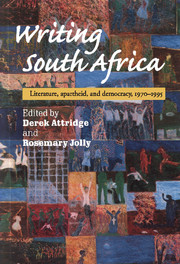Book contents
- Frontmatter
- Contents
- Contributors
- Acknowledgements and note on references
- South Africa, 1930–1996: a chronology
- Maps
- 1 Introduction
- 2 Interrogating silence: new possibilities faced by South African literature
- 3 I am dead: you cannot read: André Brink's On the Contrary
- 4 Endings and new beginning: South African fiction in transition
- 5 The post-apartheid sublime: rediscovering the extraordinary
- 6 Postmodernism and black writing in South Africa
- 7 Shame and identity: the case of the coloured in South Africa
- 8 A man's world: South African gay writing and the State of Emergency
- 9 The final safari: on nature, myth, and the literature of the Emergency
- 10 Interview
- 11 Speech and silence in the fictions of J.M.Coetzee
- 12 ‘Dialogue’ and ‘fulfilment’ in J.M. Coetzee's Age of Iron
- 13 Interview
- 14 Inside out: Jeremy Cronin's lyrical politics
- 15 Spinning out the present: narrative, gender, and the politics of South African theatre
- 16 South African theatre in the United States: the allure of the familiar and of the exotic
- Position papers
- Select bibliography: South African literary writing in English, 1970–1995
- Index
3 - I am dead: you cannot read: André Brink's On the Contrary
Published online by Cambridge University Press: 05 July 2011
- Frontmatter
- Contents
- Contributors
- Acknowledgements and note on references
- South Africa, 1930–1996: a chronology
- Maps
- 1 Introduction
- 2 Interrogating silence: new possibilities faced by South African literature
- 3 I am dead: you cannot read: André Brink's On the Contrary
- 4 Endings and new beginning: South African fiction in transition
- 5 The post-apartheid sublime: rediscovering the extraordinary
- 6 Postmodernism and black writing in South Africa
- 7 Shame and identity: the case of the coloured in South Africa
- 8 A man's world: South African gay writing and the State of Emergency
- 9 The final safari: on nature, myth, and the literature of the Emergency
- 10 Interview
- 11 Speech and silence in the fictions of J.M.Coetzee
- 12 ‘Dialogue’ and ‘fulfilment’ in J.M. Coetzee's Age of Iron
- 13 Interview
- 14 Inside out: Jeremy Cronin's lyrical politics
- 15 Spinning out the present: narrative, gender, and the politics of South African theatre
- 16 South African theatre in the United States: the allure of the familiar and of the exotic
- Position papers
- Select bibliography: South African literary writing in English, 1970–1995
- Index
Summary
A voice speaks or writes from the darkness of the slaughterhouse. A voice destined to die violently sets out to tell the story of its existence. Dying, the voice needs a story. Language and story give the functions of an individual meaning, but the individual meaning is always subsumed under the laws of language. Language reaches as far as the supra-individual reality of the subject, because the operations of language are the operations of history (Lacan, ‘The Function and Field of Language in Psychoanalysis’, 49). The necessity to create a coherent story of oneself, to justify oneself and one's actions by means of language, is the necessity to acquire the agreement, the desire of the other, although Estienne Barbier, the main character of André Brink's On the Contrary and its narrator, says: ‘I have given up trying to explain either others or myself. This is just a story’ (4). But the word ‘just’ underplays the importance and the necessity of telling the story in the face of imminent, if fictional, death. Stories are always ‘just’ that, stories, but they are always also more than ‘just’ stories. Both the story of Don Quixote and the legend of Jeanne d'Arc, integral parts of Brink's novel, demonstrate how ‘just stories’ determine the content and the style of human lives.
- Type
- Chapter
- Information
- Writing South AfricaLiterature, Apartheid, and Democracy, 1970–1995, pp. 29 - 42Publisher: Cambridge University PressPrint publication year: 1998



